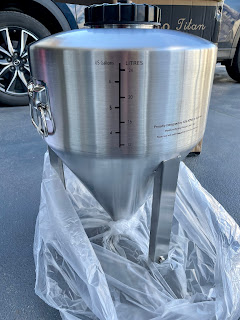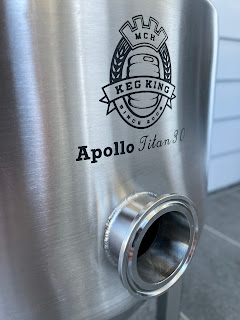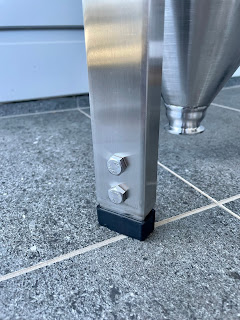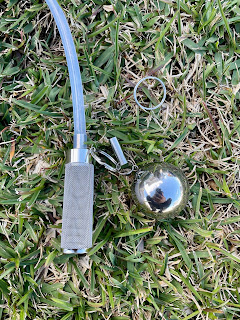When it comes to brewing equipment - stainless steel is undoubtedly the gold standard. It's hard wearing, robust, and if maintained and looked after it can last a life time. Take a look in any professional brewery and you'll notice the majority of their equipment - but particularly their tanks, are all made of stainless steel.
For the average homebrewer though, the significant cost of stainless steel equipment - in particular fermenters, has made it difficult for brewers to justify upgrading their equipment, especially given the popularity of PET plastic fermenters in recent years, which are cheaper than their stainless counterparts and are capable of achieving excellent results but do still have some limitations and restrictions on their use.
 |
| Keg King's Apollo Titan - Front View |
Thankfully though, Keg King (from Melbourne, Australia), have designed and released a stainless steel, conical, pressure capable fermenter which ticks all the boxes and is available at a seriously sharp price point - the Keg King Apollo Titan.
We got our order in early and were one of the first to take delivery and couldn't wait to break it out and put it through it's paces.
The main body and three supporting legs are manufactured with 1mm thick 304 grade stainless steel. There are two stainless handles located on each side of the main body for lifting/maneuvering - rated strong enough for use when the fermenter is full.
 |
| Keg King Apollo Titan Handles |
On the rear of the main body, we have some printed markings indicating the volume levels (in gallons and litres), as well as the maximum pressure rating of 30psi.
 |
| Keg King Apollo Titan - Rear View |
Also attached to the fermenter body are 3 x 1.5" tri clover ports. One at the very base of the cone, another part way down the cone on the front, and another located just above where the conical formation starts, also facing the front of the fermenter.
The 2 tri clover ports on the main fermenter body are an important and key differentiating factor when comparing the Apollo Titan to pressure rated PET plastic fermenters - since these PET based fermenters are not able to have these ports, the nature of the relatively thin plastic they're made of means they just aren't strong enough to do so.
With standardised 1.5" tri clover ports, any number of attachments can be fitted to the Apollo Titan. The very bottom port would typically be fitted with an elbow and dump valve for quick and easy yeast/trub removal, allowing the fermenter to be used as a true unitank. The other ports could be fitted with other accessories like sight glasses, ball valve/sample taps, or carbonation stones.
 |
| Keg King Apollo Titan - Front 1.5" tri clover port |
Leg extensions are also included to raise the height of the Apollo Titan to allow things like the aforementioned dump valve to be fitted to the most lower 1.5" tri clover opening. Extending the legs will raise the total height (to the top of the gas/liquid posts) from 574mm to 754mm.
 |
| Apollo Titan Legs (extensions are included) |
The kit comes complete with end caps, clamps and seals for all the tri clover openings so you're fermenter is ready for business straight out of the box - you can purchase and add attachments later on if you please, though you certainly don't have to. This type of modular system is a big benefit as it means brewers can add bits and pieces - like the previously mentioned valves and taps later on in their brewing journey and know that they'll fit and work since tri clover connections come in standard sizes (in this case, all are 1.5").
 |
| Apollo Titan - 3 x 1.5" tri clover clamps, end caps & seals |
Moving back to the top of the Titan and we have the same plastic based lid and collar that is used on the PET plastic based Apollo snub nose fermenter. An interesting design decision but it does make sense in a number of ways. Firstly, the design and manufacturing of this lid is already established which likely helps keep costs at a minimum by not having to design and manufacture a new one. Making a new one out of stainless steel would be more expensive, and therefore increase the total cost. Considering the lid doesn't typically come or remain in contact with the beer inside, does it really need to be made of stainless steel? We'd argue it doesn't.
 |
| Apollo Titan lid with gas/liquid posts and PRV attached |
The relatively small opening where this lid fits is key to the design. Having a smaller opening compared to other stainless fermenters that have a full diameter sized lid/opening means it's easier to seal and less likely to leak. Good news for anyone like us who has battled a leaking pressure fermenter in the past. It can also hold more pressure than many other stainless fermenters, rated with a maximum working pressure of 30psi. The size of the opening is good though, with sufficient space for a full size adult male hand and arm to reach in for thorough cleaning.
Speaking of cleaning - and this is one of the other big benefits of stainless steel - it's ability to be cleaned with hot, caustic cleaning solutions. Using these is definitely a big no-no on PET plastic based fermenters, but not with the Apollo Titan. Good news for homebrewers who prefer using hot water and more aggressive cleaning agents in their home brewery. Alternatively, you could clean it with Keg King's Keg Cleaner & Washer Kit by situating the cleaning arm through the lowest tri clover opening and letting the water pressure from the included water pump do all the work for you.
Back to the lid, and this is where the gas and liquid ball lock disconnect posts are located, along with the pressure release valve (PRV) which can be unscrewed and act as a port for dry hopping as well. The lid also houses the thermowell which is a great inclusion, since on other fermenters the thermowell would typically be fitted to one of the tri clover ports on the body of the fermenter. Having the thermowell attached to the lid essentially frees up one of these ports meaning it can be used for something else instead.
Some assembly was required for the lid, with the gas and liquid posts needing to be put together (poppet and spring inserted into the post) and then screwed onto the lid, along with the PRV housing and PRV itself. When dealing with plastic threads like these it's important not to overtighten anything so tools shouldn't be required. It's also a good idea to put some food grade lubricant on the threads to help with sealing and the prevention of gas leaks when working under pressure. The thermowell was already attached to the underside of the lid which uses a standard BSP threaded connection.
 |
| Thermowell comes pre-attached to the lid |
There is also capacity for a cooling coil to be fitted to the lid for use with glycol chilling systems - though some drilling of the plastic lid is required to accomplish this.
After assembling our Apollo Titan fermenter, we gave it a clean with PBW followed by a good rinse with water. We weren't sure whether or not the interior surface was passivated or not, so we opted for a quick/simple passivation using the citric acid based Bar Keepers friend before adding our first wort to the fermenter. Passivation may or may not have been necessary, but we opted for it anyway just in case.
 |
| Passivating our Apollo Titan with Bar Keepers Friend |
The last piece of assembly was putting together the floating dip tube, along with ball float and mesh filter. We ended up removing one of the extra rings and attached it as per the picture below. The centre ring can be fed onto the thermowell to keep the float centered in the fermenter.
Now that everything has been cleaned and assembled, we went ahead and added our wort to the fermenter and decided to fit our 1.5" tri clover sight glass so we can have some visibility of what is happening inside the fermenter. A good example of the type of attachments that can be added to the Apollo Titan.
 |
| Keg King Apollo Titan with 1.5" tri clover sight glass fitted |
As the Apollo Titan shares the same general profile/body as it's PET plastic counterpart, the Apollo insulating jackets are also compatible which can help with maintaining/stabilising the temperature within the fermenter, particularly if you'll be using it in a cooler climate.
What improvements could be made for a future revision? Firstly, the inclusion of a 1.5" tri clover opening on the top near the lid opening - purely for the purpose of dry hopping would be well received. The PRV housing on the lid can be unscrewed and used as a dry hopping port which would work well for modest amounts of dry hopping, but we expect that trying to get a few hundred grams of hops through the relatively small hole for a heavily hopped IPA might be a bit more challenging and time consuming, though some kind of funnel would probably help with this too. Having an additional tri clover fitting for the purpose of dry hopping could also allow for pressurised dry hopping contraptions to be devised and fitted to allow dry hopping doses to be purged of oxygen, and released into the fermenter without having to release the pressure within the fermenter itself. Such contraptions can essentially eliminate any risk of oxidation occurring from dry hopping.
An option for wheels/castors could also be a good (optional) extra for those who want it. With a 30L capacity, even when full a relatively fit/healthy adult can lift and maneuver the fermenter using the attached handles, however the option for wheels would no doubt help others who are perhaps unable to lift such weight, or simply for those who just want an easier and less strenuous way of moving the fermenter around when full.
Will a larger format Apollo Titan be coming in the future? We expect it's more than likely, since the PET plastic Apollo range come in 30L and 60L versions. A larger version would likely also come in a 60L format, but will also likely depend on demand and relative success of this 30L version.
The Apollo Titan is currently available on the Keg King website for AU$399.95 which represents incredible value for money. There isn't currently another pressure capable stainless steel fermenter on the market anywhere near this price point. It's a no brainer for any homebrewer looking to upgrade their equipment to stainless steel, and with the inclusion of industry standard tri clover fittings, brewers are able to purchase additional add-ons and accessories later on to help reduce the initial financial outlay as the cost of stainless steel accessories can add up quite quickly. The Apollo Titan kit comes with everything you need to get fermenting right out of the box, and the low/short profile when the extendable legs retracted (as we have it) means it should comfortably fit in just about any fermentation fridge or chamber.
Also check out our Guest Review of Keg King's Apollo Titan 30L stainless conical fermenter!





No comments:
Post a Comment